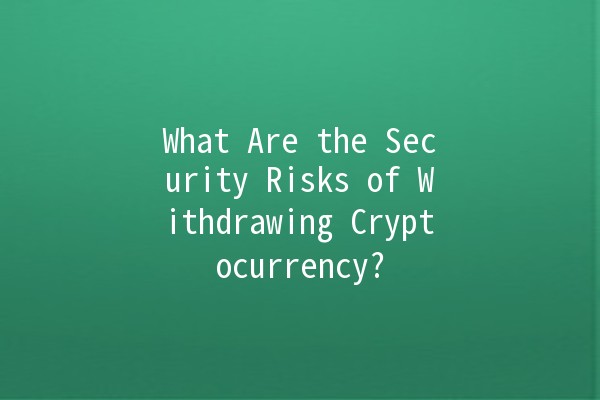
In the era of digital finance, cryptocurrency has become a prominent form of investment and transaction. However, with its rising popularity come various security risks, particularly when it comes to withdrawing cryptocurrencies. Understanding these risks is vital for anyone looking to navigate the crypto world safely. This article will delve into the potential dangers associated with cryptocurrency withdrawals and provide practical tips for mitigating these risks.
Understanding the Security Risks
Cryptocurrency withdrawal poses several potential security threats. Here are some critical issues worth considering:
Phishing attacks are a common method used by cybercriminals to steal sensitive information. In the context of crypto withdrawals, attackers may create fake websites or send fraudulent emails that mimic legitimate exchanges. Unsuspecting users may enter their login credentials or private keys, enabling hackers to access their accounts.

Tip: Always doublecheck the website URL and ensure it begins with "https". Use bookmarks to access your exchange instead of clicking on links in emails.
Many cryptocurrency exchanges impose withdrawal limits to enhance security. While this is generally a good practice, it can also lead to delays in accessing funds. Additionally, some exchanges may flag accounts for suspicious activity, causing further holdups.
Tip: Understand the withdrawal policies of your chosen exchange before investing. Ensure you complete any necessary identity verification to prevent unexpected delays.
Cybercriminals often utilize malware to infect users' devices, allowing them to capture keystroke data, including passwords and private keys. This can happen through compromised software downloads or malicious websites.
Tip: Keep your devices secure by installing reputable antivirus software and avoiding downloads from unknown sources. Regularly update your operating system and applications.
Withdrawing cryptocurrencies over public WiFi networks can expose users to maninthemiddle attacks. Hackers can intercept data sent between devices and the exchange, compromising sensitive information.
Tip: Avoid accessing your cryptocurrency accounts on public networks. Use a virtual private network (VPN) for added security if you must connect to a public WiFi signal.
Social engineering involves manipulating individuals into divulging confidential information by gaining their trust. Scammers might impersonate customer support or wellknown individuals requesting account access.
Tip: Always verify the identity of anyone asking for personal information. Use official channels to contact support when necessary and be wary of unsolicited communications.
Employees at cryptocurrency exchanges may have access to sensitive information and systems, leading to potential insider threats. A disgruntled employee could exploit vulnerabilities, compromising user funds.
Tip: Choose exchanges with robust security measures and a good reputation. Research their security policies and how they handle insider threats.
Enhancing Your Cryptocurrency Withdrawal Security
To ensure a secure experience when withdrawing cryptocurrencies, implement the following best practices:
Storing your cryptocurrencies in hardware wallets provides an extra layer of security. Unlike online wallets, hardware wallets are offline, making it difficult for hackers to access your funds.
Example: Consider using wallets like Trezor or Ledger that allow you to store multiple assets securely.
Enabling 2FA on your exchange accounts greatly enhances security. This additional authentication step requires a second form of identification in addition to your password.
Example: Use apps like Google Authenticator or Authy for generating secure codes.
Conducting regular security audits of your accounts and devices can help identify potential vulnerabilities. Regularly review your transaction history for anomalies and unusual activity.
Stay informed about the latest security threats and trends in the cryptocurrency space. Knowledge is power, and understanding potential vulnerabilities can help mitigate risks.
Always backup your wallet and recovery keys securely. Ensure your recovery phrases are stored safely, away from prying eyes, in case you need to restore access to your funds.
Frequently Asked Questions (FAQs)
If you suspect a phishing attempt, immediately change your passwords and enable 2FA on your accounts. Report the phishing attempt to the relevant exchange and to the authorities.
Research the exchange’s reputation and read user reviews. Ensure they have undergone security audits and have a transparent history regarding their security practices.
Decentralised exchanges eliminate the need for a central authority, increasing user control. However, they can lack builtin security measures, leaving users responsible for managing their funds.
Legal recourse can be challenging in the crypto world due to its decentralized nature. Reporting to local authorities and to the exchange involved is essential, but there is no guarantee of recovering lost funds.
Using the same password across different platforms can expose you to greater risk. If one account is compromised, all related accounts may be at risk. Always use unique passwords for each account.
Backing up your wallet ensures that you can recover access to your funds in case of device loss or failure. It allows you to restore your wallet on another device securely.
By understanding the risks associated with cryptocurrency withdrawals and implementing robust security measures, you can significantly reduce the likelihood of falling victim to scams and attacks. Ensuring your funds' safety is vital in this evolving digital landscape, and being proactive can make all the difference in safeguarding your investments.

